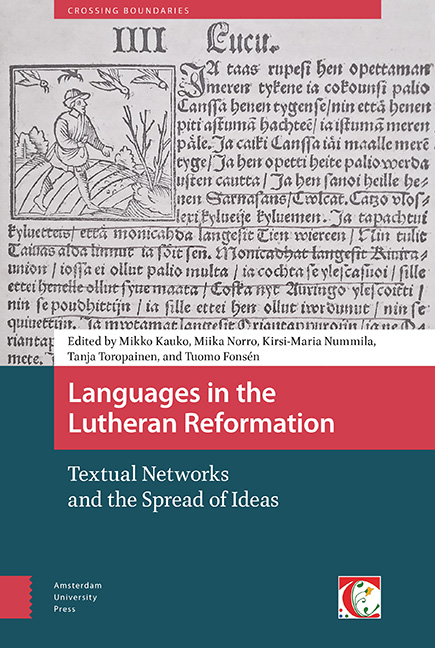Book contents
- Frontmatter
- Contents
- List of Figures and Tables
- Preface
- Introduction
- Part I The Reception of Luther's Ideas and their Influence for the Development of Written Languages
- Part II Effects of Bible Translations on the Evolution of Written Language
- Part III Reuse of (Catholic) Texts after the Reformation
- Part IV Language Contacts and Loanwords
- Index
11 - Medical Discourse in the Oldest Lithuanian Lutheran Texts
Published online by Cambridge University Press: 21 November 2020
- Frontmatter
- Contents
- List of Figures and Tables
- Preface
- Introduction
- Part I The Reception of Luther's Ideas and their Influence for the Development of Written Languages
- Part II Effects of Bible Translations on the Evolution of Written Language
- Part III Reuse of (Catholic) Texts after the Reformation
- Part IV Language Contacts and Loanwords
- Index
Summary
Abstract
The focus of this paper is medical terminology and discourse in 16th-century Lithuanian Lutheran books, the oldest and most important documents of the kind in the Lithuanian language. The central questions raised address the issues of whether the early Lutheran vernacular texts prepared in Prussia dealt with medical concerns; how they influenced the development of Lithuanian medical terminology; what was the role of the popular religious literature in the dissemination of medical knowledge in lay society. The early Lutheran texts in Lithuanian show that the compilers and translators of these texts created the foundation for Lithuanian medical terminology reaching far beyond the vernacular and Latin.
Keywords: Lithuanian literature, medical terminology
Medicine and Christianity: the protestantization of medicine
The relationship between religion and medicine in the 16th century has attracted considerable attention among scholars in the recent times. This research has yielded many interesting results, showing that Christianity and the practice of medicine were interconnected in a very tight way. As an example, Andrew Cunningham (2001: 44) has claimed that anatomy, being the central issue of early modern medicine, could not be thought of outside the context of Christianity in the mediaeval and early modern eras. Anatomy was part of the philosophy of nature, which held theoretically that the world was created by God. Medicine and anatomy were not separated from the problems of the soul, just as physica was connected with metaphysica. According to Dijkhuizen (2009: 189), illnesses and bodily suffering were also interpreted and experienced within a Christian framework and connected to spiritual improvement. Nonetheless, pain was still seen as an evil resulting from original sin (Pender 2008: 474).
Even though it is a debated question, it can be argued that the Reformation had a significant influence on medical innovations of the 16th century (Helm 2001: 51), and thus the interconnection between medical innovations and evangelical thought can be conceived as the ‘protestantization’ of early modern medicine. Cunningham, trying to explain what would constitute a ‘Protestant’ form of anatomizing, stressed that the conception of the human body as the culmination of creation was not altered with the Reformation but, rather, emphasized by Protestants (Cunningham 1997: 105-252).
- Type
- Chapter
- Information
- Languages in the Lutheran ReformationTextual Networks and the Spread of Ideas, pp. 253 - 272Publisher: Amsterdam University PressPrint publication year: 2019



